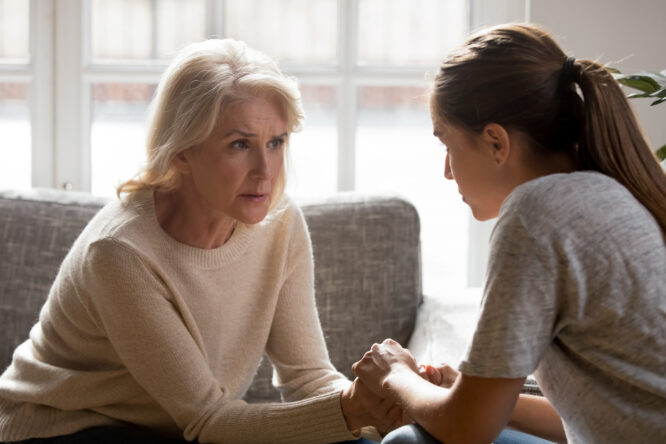Are you that friend everyone calls when they’re having a crisis? The one people seek out when they need to vent about their boss, their relationship, or their family drama?

If you’re nodding along, there’s a good chance you’ve become everyone’s emotional dumping ground without even realising it. While being supportive is a wonderful quality, there’s a difference between being a good friend and being someone’s unpaid therapist. When you’re constantly absorbing other people’s problems without getting much support in return, it can seriously drain your energy and mess with your own mental health. Here are some signs that you might be carrying way more emotional baggage than just your own.
1. People only contact you when they have problems.

Your phone buzzes and you already know it’s going to be someone having a meltdown. They never call to share good news, ask how you’re doing, or just chat about random stuff. It’s always drama, always a crisis that needs your immediate attention and endless reassurance. You’ve become their emotional emergency contact, but they’re nowhere to be found when you need support.
This pattern is exhausting because it turns your relationships into one-way streets where you’re always giving but rarely receiving. You start to dread seeing certain names pop up on your phone because you know it means another hour of listening to problems you can’t actually solve. The worst part is that these people often disappear once their crisis passes, only to resurface when the next disaster strikes.
2. You feel drained after most social situations.

Hanging out with friends shouldn’t feel like running a marathon, but lately, that’s exactly how you feel after most social gatherings. You come home emotionally exhausted, not because you had a bad time, but because you spent the entire evening listening to everyone else’s problems and offering support. What should have been fun and energising instead left you feeling like you need a holiday.
This constant emotional labour is taking a toll on your own wellbeing. You might find yourself avoiding social situations altogether because you just don’t have the energy to handle everyone else’s stuff on top of your own. It’s a clear sign that your relationships have become imbalanced, and you’re doing way more emotional heavy lifting than anyone else.
3. People interrupt you to talk about themselves.

You’ll start sharing something about your day or your feelings, and within minutes the conversation has somehow shifted back to their problems. They might say something like “Oh, that reminds me of what happened to me” and then launch into a twenty-minute monologue about their own drama. Your experiences become launching pads for their stories rather than topics worth exploring.
This behaviour shows that these people see you more as a sounding board than an actual person with your own thoughts and feelings. They’re not really listening to you; they’re just waiting for their turn to talk. It’s particularly frustrating because it makes you feel invisible and unimportant, even though you’re the one doing all the emotional work in the relationship.
4. Your own problems feel too small to mention.

When everyone else is dealing with major life crises, your everyday struggles start to feel insignificant by comparison. You stop sharing your own stress because it doesn’t seem as important as their relationship drama or work problems. You’ve internalised the idea that your role is to be the strong one who helps everyone else, not someone who needs help themselves.
This mindset is dangerous because it invalidates your own experiences and emotions. Your problems don’t have to be earth-shattering to be worth discussing. Everyone deserves support and understanding, including you. When you consistently minimise your own needs to make room for everyone else’s, you’re setting yourself up for burnout and resentment.
5. People get upset when you’re not immediately available.

If you don’t respond to their crisis texts within an hour, or if you say you can’t talk right now, they get annoyed or guilt-trip you. They might say things like “I really needed you” or “I thought I could count on you” when you’re not instantly available to provide emotional support. They’ve come to expect your constant availability and react poorly when you set any boundaries.
This expectation is completely unreasonable and unfair. You’re not their personal therapist on call 24/7, and you have your own life to live. People who truly care about you would understand that you can’t always drop everything to manage their emotions. The fact that they get upset when you’re unavailable shows they see you more as a service provider than a friend.
6. You know intimate details about everyone’s life.

You could probably write biographies about your friends and acquaintances because they’ve shared every detail of their personal lives with you. You know about their family histories, relationship problems, work stress, health issues, and financial troubles. You’re like a walking database of everyone else’s personal information, but you wonder if they could tell you much about your own life.
This one-sided information sharing creates an uncomfortable imbalance in your relationships. While it’s normal for close friends to confide in each other, healthy relationships involve mutual sharing and vulnerability. When you’re always the repository for everyone’s secrets but rarely share your own, it shows that the relationship is more about what you can provide than genuine connection.
7. You dread checking your messages.

Opening your texts or social media feels like bracing for impact because you know there’s probably another emotional crisis waiting for you. You’ve started to associate your phone buzzing with stress rather than excitement about connecting with friends. The constant stream of other people’s problems has made communication feel like a burden rather than a joy.
This dread is a clear sign that your relationships have become emotionally overwhelming. Healthy friendships should make you feel happy when you hear from people, not anxious about what new drama they’re going to unload on you. When your phone becomes a source of stress rather than connection, it’s time to seriously evaluate how these relationships are affecting your mental health.
8. People expect you to remember every detail of their problems.

They’ll reference conversations from weeks ago and get upset if you don’t immediately remember every aspect of their complicated situation. They expect you to keep track of all the players in their drama, remember important dates in their crisis timeline, and follow up on how things are progressing. It’s like you’re expected to maintain detailed case files on everyone’s personal problems.
This expectation puts enormous pressure on you to be emotionally invested in everyone else’s life to an unrealistic degree. While it’s nice to remember important things about your friends, expecting someone to track every detail of your ongoing drama is excessive. It shows they view you as their personal emotional assistant, rather than a friend with your own life to focus on.
9. You feel guilty when you don’t want to listen.

Sometimes you just don’t have the emotional capacity to absorb someone else’s problems, but instead of feeling okay about that, you feel guilty and selfish. You’ve been conditioned to believe that being a good friend means always being available for emotional support, regardless of your own mental state. This guilt keeps you trapped in exhausting patterns even when you desperately need a break.
This guilt is misplaced because you’re not responsible for managing everyone else’s emotions. Setting boundaries around when and how much emotional support you can provide is healthy and necessary. A real friend would want you to take care of yourself and wouldn’t make you feel bad for having limits. The fact that you feel guilty for basic self-preservation shows how imbalanced these relationships have become.
10. Your advice is ignored, but they keep coming back.

You spend time thinking through their problems and offering thoughtful advice, but they consistently ignore your suggestions and continue making the same mistakes. They don’t really want solutions; they just want someone to validate their feelings and listen to them complain. Yet, they keep coming back to you for more advice they won’t take, creating a frustrating cycle of wasted emotional energy.
This pattern is particularly draining because it makes you feel like your input doesn’t matter, even though you’re putting significant time and emotional energy into trying to help. It’s also a sign that these people are more interested in having an audience for their problems than actually solving them. You’re not a therapist, and you don’t need to provide unlimited emotional labour to people who aren’t genuinely interested in change.
11. You’ve become the group therapist.

In group settings, everyone automatically turns to you when someone’s upset or when drama emerges. You’re expected to mediate conflicts, provide emotional support, and help everyone process their feelings. What should be casual social time becomes group therapy sessions where you’re the unpaid facilitator managing everyone else’s emotional needs.
This role is exhausting and unfair because it prevents you from just enjoying yourself in social situations. You can’t relax and have fun when you’re constantly monitoring everyone’s emotional temperature and ready to jump into crisis management mode. It also means other people in the group don’t develop their own emotional intelligence and support skills because they’re relying on you to handle everything.
12. People disappear when you need support.

The moment you try to share your own struggles or ask for emotional support, these people suddenly become unavailable. They’re busy, stressed, or dealing with their own stuff—funny how that never seemed to matter when they needed you. You’ve been there for them through countless crises, but when you need someone to listen, they’re nowhere to be found.
This disappearing act reveals the true nature of these relationships: they’re completely one-sided. These people have got used to taking your emotional labour without giving anything back, and they don’t know how to be supportive when the roles are reversed. It’s a painful realisation, but it’s important information about who actually cares about you versus who just uses you for emotional support.
13. You’re exhausted but can’t figure out why.

You’re constantly tired and emotionally drained, but your own life doesn’t seem particularly stressful or overwhelming. The exhaustion comes from carrying the emotional weight of multiple people’s problems on top of your own daily stresses. It’s like having several part-time jobs as an unpaid counsellor, and it’s wearing you down, even though you might not consciously realise why.
This chronic fatigue is your body and mind telling you that you’re taking on too much emotional labour. Just like physical overexertion leads to exhaustion, emotional overextension has the same effect. You need to start protecting your emotional energy the same way you’d protect your physical energy—by setting limits and not overcommitting yourself to other people’s problems.
14. You’ve lost touch with your own emotions.

You’ve become so focused on everyone else’s feelings that you’ve lost track of your own. You can instantly identify what mood your friends are in and what they need emotionally, but you struggle to check in with yourself or even know how you’re feeling on any given day. Your emotional awareness has become entirely externally focused, leaving your own inner world neglected.
This disconnection from your own emotions is dangerous because it makes it impossible to take care of your own mental health. You can’t address your own needs if you don’t even know what they are. It’s time to start turning some of that emotional attention inward and remember that your feelings matter just as much as everyone else’s. Learning to say no to being everyone’s therapist is the first step toward reconnecting with yourself.




